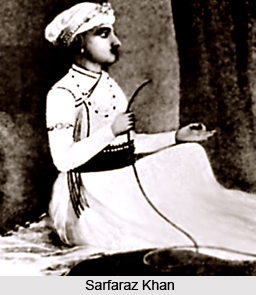 Sarfaraz Khan ascended the throne as the Nawab of Bengal after the death of his father Shuja- Ud- Din Muhammad Khan in the year 1739. Sarfaraz Khan was born as Mirza Asadullah, sometime after 1700 and the title of Sarfaraz Khan was conferred upon him by the Mughal Emperor Farrukh Siyar in the year 1720. He was the Diwan of Bengal from 1720 to 1726. Sarfaraz Khan was the elder son of Shuja- Ud- Din Muhammad Khan. His mother was Zainab- un-Nisa Begum the daughter of Murshid Quli Khan the first Nawab of Bengal.
Sarfaraz Khan ascended the throne as the Nawab of Bengal after the death of his father Shuja- Ud- Din Muhammad Khan in the year 1739. Sarfaraz Khan was born as Mirza Asadullah, sometime after 1700 and the title of Sarfaraz Khan was conferred upon him by the Mughal Emperor Farrukh Siyar in the year 1720. He was the Diwan of Bengal from 1720 to 1726. Sarfaraz Khan was the elder son of Shuja- Ud- Din Muhammad Khan. His mother was Zainab- un-Nisa Begum the daughter of Murshid Quli Khan the first Nawab of Bengal.
When Murshid Quli Khan died on 30th June 1727, he nominated his maternal grandson Sarfaraz Khan as the heir to his throne. But he was removed from his position by his own father Shuja- Ud- Din Muhammad Khan, who ascended the throne in July 1727. He was made the Diwan of Bengal for sometime early into the reign of his father Shuja- Ud- Din and later became the Nazim of Jahangir Nagar in Dhaka. After the death of his father in 1739, Sarfaraz Khan succeeded as the next Nawab of Bengal.
Sarfaraz Khan was known for his religious and pious nature. He left the system of administration into the hands of his Nazims and deputy Nazims as religious matters was his priority. He hardly showed any interest in administrative policy or economic matters and this resulted in the gradual rise of Alivardi Khan who was the Nazim of Azimabad in Patna. Sarfaraz Khan was a pious man, full of the outward forms of devotion, and very regular in his stated prayers and ablutions. He fasted in the holy month of Ramzan and was meticulous in the execution of the various forms of devotion to be attended to at different periods all through the year. But he lacked the qualities of mind and administration that should be present in a man of his rank and position. He willfully bestowed the reigns of his government into the hands of few interested noblemen who had their own interest to fulfill. Nobles like Haji Lutfullah, Mardan Ali Khan and Mir Murtaza who had a long time grudge against Haji Ahmed, the brother of Alivardi Khan and poisoned Sarfaraz Khan"s ears and thus had him removed from the office of Diwan, a position he was holding onto since the time of Shuja- Ud- Din Muhammad Khan. His position was thereby given to Mir Murtaza.
The injustice meted out to his brother Haji Ahmed angered Alivardi Khan and he resolved to take the revenge. He conspired against Sarfaraz Khan and on March 1740 he set out for Murshidabad on the context of expedition to Bhojpur. Alivardi Khan informed Sarfaraz Khan that he was not marching on him but was arriving to give reverence to the Nawab. Initially Sarfaraz Khan was satisfied but eventually decided to march on with his army. The two opposing armies met at Giria, a village on the banks of Bhagirathi River. Alivardi Khan was a far superior warrior than Sarfaraz Khan and even at the ripe age of seventy he knew the weak points of Sarfaraz Khan. In the battle of Giria, Sarfaraz Khan was defeated and killed. The remnants of his army continued to put up a brave fight but could not beat Alivardi Khan. The cause for this disaster was that Sarfaraz Khan never saw what was coming in the form of Alivardi Khan and did not take defensive actions in time. Sarfaraz was more concerned with Nadir Shah whom he considered a bigger threat.
Sarfaraz Khan ruled for a little more than thirteen months. He had had five sons and five daughters but none of them were capable to extend the rule further. The Nasiri dynasty came to an end with the death of Sarfaraz Khan.






